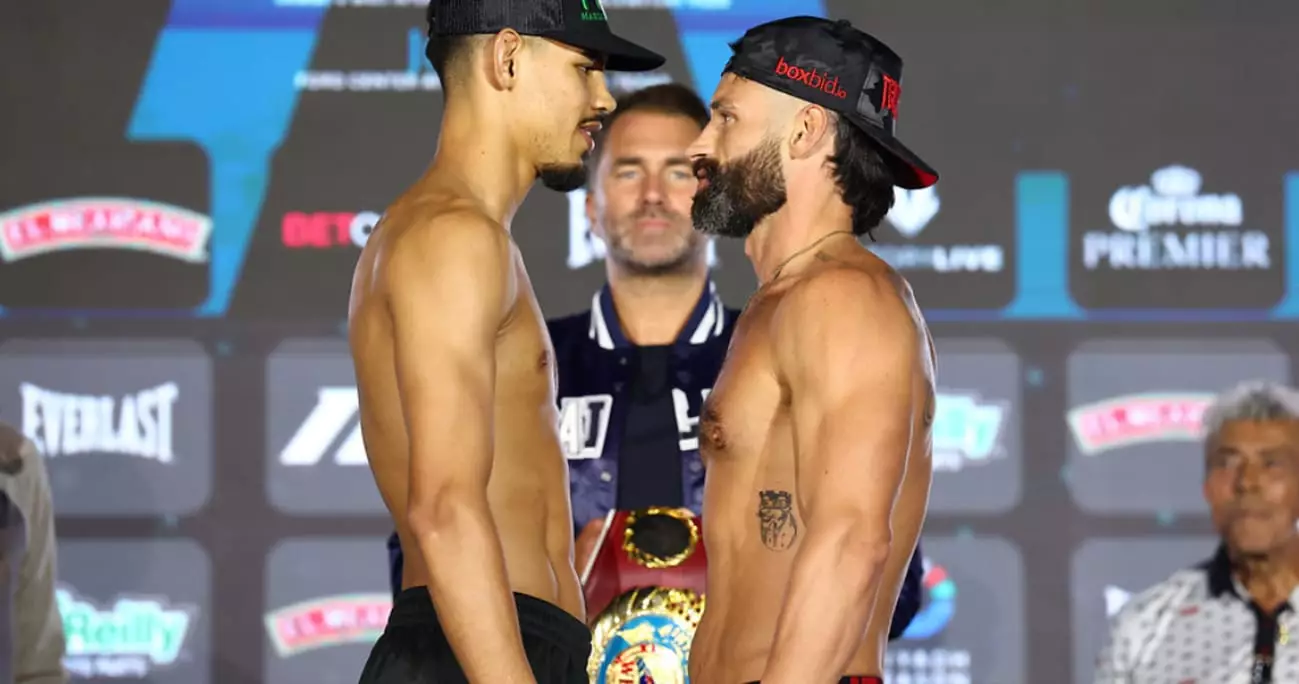Boxing is a sport that consistently showcases the unpredictable nature of human strength, resilience, and mental fortitude. The recent weigh-ins for the highly anticipated showdown at The Ford Center in Frisco, Texas, epitomize this dynamic, especially in the case of Jesse ‘Bam’ Rodriguez. While the official results confirmed that fighters are within weight limits—an expected procedural milestone—the true story unfolds far beyond numbers on a scale. It’s about the psychological battlefield, the narratives fighters craft about themselves, and the perceptions that shape public opinion. For Rodriguez, an ace in the making, the weight in the ring is not merely physical but mental, emotional, and often political.
Despite having an impressive record and a reputation as a double unified champion, Rodriguez’s confidence appears both palpable and, at times, fragile. His statement, “this is just another day at the office,” hints at a well-built mental armor. But reality has a nasty way of testing even the most confident fighters. The assertion that Cafu will need to perform an extraordinary feat to even win a decision exposes a confidence that borders on bravado—yet it also lays bare the inherent doubts that every fighter secretly harbors. Confidence in boxing, when unjustified, can transform into arrogance that blinds fighters to their vulnerabilities. Conversely, a well-grounded belief in oneself can serve as a protective shield, fueling resilience in moments of adversity.
Rodriguez’s stance also reflects an understanding of the political and audience factors surrounding his fights. Fighting in Texas, in front of over 10,000 home fans, evokes a double-edged sword—supportive yet potentially hostile if results do not favor the local hero. Fighters like Bam are often caught between their self-belief and the brutal reality of a single lost match which, in the eyes of the public, can tarnish a career. This pressure is an often invisible weight every boxer carries, reminding us that boxing is as much a mental game as it is physical.
The Illusion of Invincibility and Overreaching Expectations
Eddie Hearn’s praise of Jesse Rodriguez as a “generational great” and a future multi-division champion reflects both his confidence in the fighter’s talent and the dangerous allure of high expectations. We are prone to embellishing the potential of promising athletes, sometimes ignoring the reality that greatness requires sustained excellence and a touch of luck. There’s a thin line between belief and hubris, and in boxing, that line often gets blurred. Calling Rodriguez a “generational” talent may be sincere, but it also feeds a narrative that can distort fans’ and promoters’ perceptions of what it takes to actualize such greatness.
The reality is that weight class boundaries are formidable hurdles. Fighters like Inoue, Nakatani, and Espinoza represent a level of competition that can expose even the most talented young fighters as overmatched. To achieve the sort of multi-weight dominance Rodriguez’s promoters envisage, he would need to conquer fighters whose skills and power challenge even seasoned champions. This is where the dialogue about confidence becomes central: it’s not just about fighting skills but about how much a fighter believes in himself when facing these gargantuan obstacles.
Fighters often speak about mindset—how confidence can carry them through tough times. Yet, overconfidence can blind them to tactical adjustments, fatigue, or even the plain reality of how dangerous their opponents are. Cafu, with his reputation as a heavy puncher and a confident attitude, presents a real threat that could puncture any fighter’s bubble of invincibility. If Rodriguez underestimates Cafu or lets nerves seep into his performance, the outcome could be far less favorable than the bravado suggests.
The Politics of Performance and the Cost of Expectations
The narrative surrounding Rodriguez’s potential rise, promoted heavily by figures like Eddie Hearn, creates a social contract rooted in hope. Fans want to believe in a new superstar, and promoters thrive on hyping prospects. However, the danger lies in conflating potential with guaranteed success. A single loss, especially in front of a home crowd, can have ripple effects that extend beyond the ring, affecting sponsorship deals, future matchmaking, and a fighter’s mental state.
The glorification of Rodriguez’s future greatness also raises questions about the pressure young athletes face. The “next great” tag can be a double-edged sword—fueling motivation or crushing confidence if not managed carefully. This pressure can lead fighters to overreach, to fight beyond their capacity, or to rely excessively on their reputation rather than their skill. The risk of overconfidence leading to complacency or misjudging an opponent’s toughness is a familiar theme in boxing history, where many promising careers have faltered after a single defeat.
The upcoming fight is more than just a test of physical prowess; it symbolizes the ongoing battle fighters face within themselves. Confidence, whether justified or illusory, forms the core of their identity in the ring. But without a balanced understanding of one’s true ability and respect for the opponent’s power, even the brightest stars risk crumbling under the weight of their own expectations. As fans and analysts, our fascination lies in this mix of hope, bravado, and vulnerability—reminding us that boxing is as much a battle of the mind as it is of the body.

